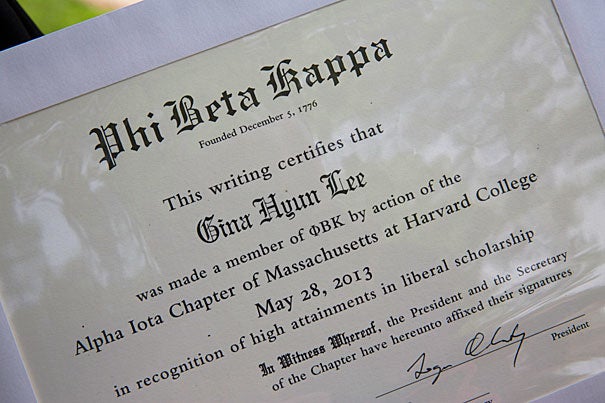
Naming honorary members and awarding the Alpha Iota Prize for Excellence in Teaching are also part of the Phi Beta Kappa Literary Exercise. Those prizes go to three — sometimes two — members of the Faculty of Arts and Sciences. Only PBK undergraduate members are allowed to nominate the candidates.
Kris Snibbe/Harvard Staff Photographer
Three win Alpha Iota Prize for Excellence in Teaching
The PBK Literary Exercises focus on a poet and a speaker every year. But they also provide an occasion for naming honorary members and for awarding the Alpha Iota Prize for Excellence in Teaching. Those prizes go to three — sometimes two — members of the Faculty of Arts and Sciences. Only PBK undergraduate members are allowed to nominate the candidates.
Honorary memberships in Harvard’s Alpha Iota of Massachusetts chapter, chartered in 1781, typically go to graduates of Harvard and Radcliffe classes 50 years earlier and to faculty members who have recently retired, or are close to retirement.
Recipients of the honorary memberships: His Excellency the Right Hononorable David Johnston ’63, Governor General of Canada, who was a two-time All-American hockey player at Harvard; concert pianist, period instrumentalist, and musicologist Steven Lubin ’63, who studied philosophy as an undergraduate; Columbia University Professor of Environmental Health Sciences Frederica Perera ’63, a pioneer in molecular epidemiology; Harvard Corporation Senior Fellow and economist Robert Reischauer ’63, who had a long career in public service; Princeton University econometrician Christopher Sims ’63, who shared the 2011 Nobel Prize in economics; and onetime philosophy concentrator Gurcharan Das ’63, who became a public intellectual in his native India after a 30-year corporate career with Procter & Gamble.
The Harvard professors receiving honorary memberships were scholar of Portuguese poetry Joaquim-Francisco Coelho, the Nancy Clark Smith Professor of the Language and Literature of Portugal and Professor of Comparative Literature; international relations scholar Stanley Hoffmann, the Paul and Catherine Buttenwieser University Professor; and computer scientist and encryption expert Michael Rabin, the Thomas J. Watson Sr. Research Professor of Computer Science.
The teaching prize recipients: Jacob Barandes (physics) was cited for making the difficult understandable — by explaining, for instance, the physics of beer. Stephen Blyth (statistics), one student wrote, offered “a seamless blend of theory and application,” in part through his course on Wall Street risk and uncertainty, which included a simulated portfolio. Innovative teacher Amanda Claybaugh (English), another student offered, “helps her students read, write, and think in new ways.” She once assigned book reviews instead of papers.




